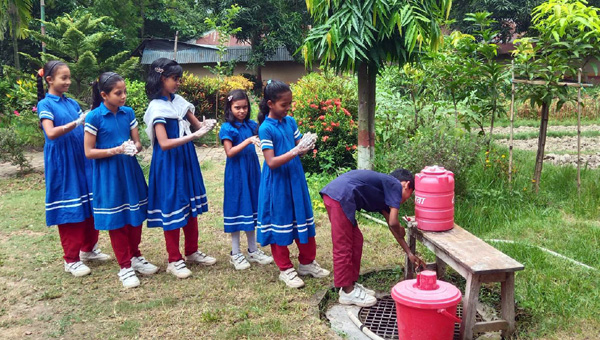
NAGR Health and Hygiene Activities Outline
1. Integrated Community Development Initiative (ICDI)
Objective: Improve overall health and hygiene standards in the community.
Activities:
Health awareness campaigns on sanitation and personal hygiene.
Distribution of hygiene kits (soap, sanitizers, masks).
Training community members in basic hygiene practices.
Establishment of community health monitoring systems.
2. Clinic & Village Health Project
Objective: Provide basic healthcare services and hygiene education to rural populations.
Activities:
Regular health check-up camps for villagers.
Immunization and vaccination drives.
Health education on water purification and sanitation.
Provision of free health consultations, medicines, and hygiene products.
3. Indigenous Kol Peoples Development Project
Objective: Enhance health and hygiene for the indigenous Kol community.
Activities:
Introduction of hygiene practices tailored to indigenous customs and needs.
Setting up of community health centers focusing on primary healthcare and sanitation.
Educating about clean drinking water and waste disposal methods.
Access to clean energy for cooking and heating to reduce indoor pollution.
4. Village Primary School
Objective: Promote health and hygiene education for children.
Activities:
Health education curriculum integrated into the school system.
Handwashing campaigns and hygiene practices taught regularly.
Provision of clean water and sanitation facilities at the school.
Monitoring of students for common health issues (malnutrition, dehydration).
5. Coaching & Advocacy Training Program for PSC, JSC, SSC & HSC Candidates
Objective: Raise awareness on health and hygiene among youth.
Activities:
Workshops on the importance of maintaining personal hygiene during exam periods.
Training sessions on stress management and maintaining mental health.
Collaboration with local healthcare professionals to provide health tips.
6. Tabitha Kindergarten School
Objective: Promote early childhood health and hygiene awareness.
Activities:
Daily hygiene routines (handwashing, oral hygiene) for young children.
Teaching simple health concepts through stories and games.
Health monitoring of children for early signs of illness.
Ensuring access to safe drinking water and sanitary restrooms.
7. Nozipur Girls Hostel & Education Program
Objective: Ensure health and hygiene standards for girls in the hostel.
Activities:
Regular health check-ups for all girls residing in the hostel.
Ensuring the availability of feminine hygiene products and counseling.
Promotion of personal hygiene habits, including menstrual hygiene.
Health education programs focused on adolescent health issues.
8. Sanitation & Deep Tube Well
Objective: Improve access to clean water and sanitation.
Activities:
Installation of deep tube wells in villages to ensure access to safe drinking water.
Construction of community sanitation facilities (toilets, waste disposal systems).
Awareness programs on the importance of sanitation and proper waste management.
Regular cleaning and maintenance of water and sanitation infrastructure.
9. Covid-19 Awareness Program for Village People
Objective: Educate communities about Covid-19 prevention and hygiene.
Activities:
Distribution of masks, sanitizers, and educational pamphlets.
Organizing community-based Covid-19 awareness workshops.
Setting up Covid-19 testing and vaccination centers in villages.
Teaching social distancing and other hygiene practices to prevent the spread of the virus.
10. Socio-Economic Development Activities by Income Generating Projects
Objective: Address health issues linked to poverty and improve hygiene through economic development.
Activities:
Vocational training programs with a focus on health and hygiene-related sectors (cleaning, food safety).
Supporting income-generating activities that promote hygienic practices (organic farming, eco-friendly products).
Providing microfinance or loans for health-related business initiatives.
Conducting workshops on nutrition and healthy lifestyles.
11. Indigenous Prep. School
Objective: Provide education on health and hygiene to indigenous children.
Activities:
Regular health and hygiene training sessions for both children and parents.
Supply of hygienic materials (soap, water filters, and health education resources).
Construction of hygienic school facilities with safe drinking water and clean restrooms.
12. Handicraft Project
Objective: Promote health and hygiene through community engagement in handicraft activities.
Activities:
Creating hygiene-related handicrafts (e.g., cloth masks, hand towels) for sale or distribution.
Offering workshops on maintaining cleanliness while working with handicrafts.
Raising awareness about hygiene in local markets where handicrafts are sold.
Using part of the profits from handicraft sales to fund hygiene and health initiatives in the community.